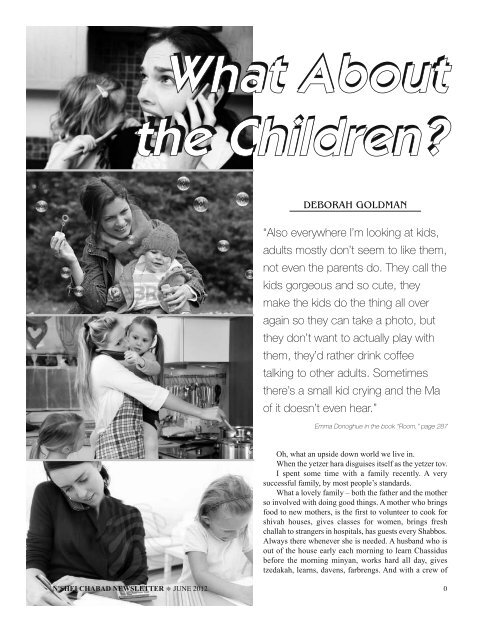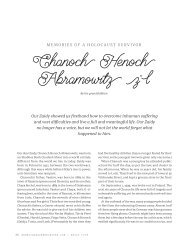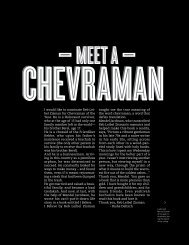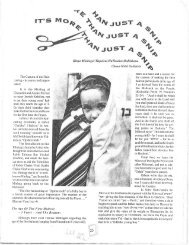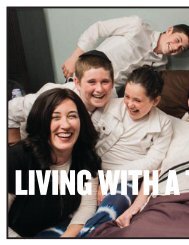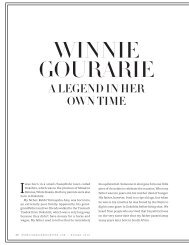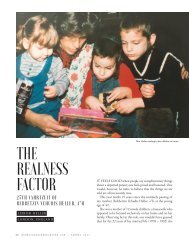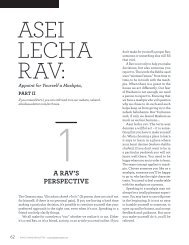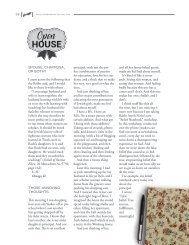What About the Children?
What About the Children? by Deborah Goldman, June 2012
What About the Children? by Deborah Goldman, June 2012
You also want an ePaper? Increase the reach of your titles
YUMPU automatically turns print PDFs into web optimized ePapers that Google loves.
<strong>What</strong> <strong>About</strong><br />
<strong>the</strong> <strong>Children</strong>?<br />
DEBORAH GOLDMAN<br />
“Also everywhere I’m looking at kids,<br />
adults mostly don’t seem to like <strong>the</strong>m,<br />
not even <strong>the</strong> parents do. They call <strong>the</strong><br />
kids gorgeous and so cute, <strong>the</strong>y<br />
make <strong>the</strong> kids do <strong>the</strong> thing all over<br />
again so <strong>the</strong>y can take a photo, but<br />
<strong>the</strong>y don’t want to actually play with<br />
<strong>the</strong>m, <strong>the</strong>y’d ra<strong>the</strong>r drink coffee<br />
talking to o<strong>the</strong>r adults. Sometimes<br />
<strong>the</strong>re’s a small kid crying and <strong>the</strong> Ma<br />
of it doesn’t even hear.”<br />
Emma Donoghue in <strong>the</strong> book “Room,” page 287<br />
Oh, what an upside down world we live in.<br />
When <strong>the</strong> yetzer hara disguises itself as <strong>the</strong> yetzer tov.<br />
I spent some time with a family recently. A very<br />
successful family, by most people’s standards.<br />
<strong>What</strong> a lovely family – both <strong>the</strong> fa<strong>the</strong>r and <strong>the</strong> mo<strong>the</strong>r<br />
so involved with doing good things. A mo<strong>the</strong>r who brings<br />
food to new mo<strong>the</strong>rs, is <strong>the</strong> first to volunteer to cook for<br />
shivah houses, gives classes for women, brings fresh<br />
challah to strangers in hospitals, has guests every Shabbos.<br />
Always <strong>the</strong>re whenever she is needed. A husband who is<br />
out of <strong>the</strong> house early each morning to learn Chassidus<br />
before <strong>the</strong> morning minyan, works hard all day, gives<br />
tzedakah, learns, davens, farbrengs. And with a crew of<br />
N'SHEI CHABAD NEWSLETTER JUNE 2012 0
lovely children too.<br />
Oh, how beautiful. “I don’t know how you do it,” people<br />
smile approvingly to <strong>the</strong> mo<strong>the</strong>r of <strong>the</strong> family. “You and your<br />
wife are such a power couple,” is what <strong>the</strong> husband hears<br />
over and over again. “You must be so proud,” is what <strong>the</strong><br />
grandparents hear wherever <strong>the</strong>y go.<br />
But <strong>the</strong>re is a deep dark secret in this family. So secret<br />
that even <strong>the</strong> parents <strong>the</strong>mselves are not aware of what is<br />
going on.<br />
The children are suffering.<br />
Some of <strong>the</strong> children cry very easily. They do not know<br />
how to put it into words, but <strong>the</strong> pressure is building up in<br />
<strong>the</strong>m. One of <strong>the</strong> children does not know when to stop<br />
eating. She eats and eats and is seldom seen going down a<br />
slide or riding a bicycle. Ano<strong>the</strong>r child hardly eats at all. He<br />
is thin and weak and lethargic. And <strong>the</strong>n <strong>the</strong>re is <strong>the</strong> baby,<br />
who cries inconsolably when her mo<strong>the</strong>r is out of sight, and<br />
often has a blank expression on her face. The children don’t<br />
play that much – <strong>the</strong>y are busy crying and whining for <strong>the</strong>ir<br />
parents’ attention. They are irritable, and trying to soo<strong>the</strong> and<br />
reassure <strong>the</strong>mselves through rituals and comfort objects.<br />
Parental attention is <strong>the</strong> real currency in this family.<br />
<strong>What</strong> is going on here?<br />
These children are mommy-deprived. Even when<br />
Mommy is right <strong>the</strong>re, nursing, playing, pushing <strong>the</strong>m on<br />
<strong>the</strong> swings, her body is <strong>the</strong>re, but her heart and soul are not.<br />
She is on her cell phone. She is planning – what to cook,<br />
what to speak about, how to arrange. She is texting while <strong>the</strong><br />
children are talking to her. Her children’s unconscious<br />
minds are tuned in to what she is thinking and that cancels<br />
out what she is doing. Yes, it is possible to nurse but not<br />
really satisfy, to care for but not really nurture. And that is<br />
why, for <strong>the</strong>se children, it looks like <strong>the</strong>y are having <strong>the</strong>ir<br />
needs filled, but <strong>the</strong>y are not. Their mommy is so busy that<br />
<strong>the</strong>re is not much space left for <strong>the</strong>m, and <strong>the</strong>y feel it. They<br />
are too young to express <strong>the</strong>ir pain in words, but <strong>the</strong>y feel it.<br />
“Oh, but children are resilient,” is what we hear. Yes, that is<br />
what we tell ourselves so that we can sleep well when we<br />
are neglecting our children.<br />
When I see a baby get up from his nap, see one of his<br />
parents, but not run to <strong>the</strong>m with a cry of joy, I know we’re<br />
in trouble. When <strong>the</strong> parents don’t beam at <strong>the</strong> baby who just<br />
rejoined <strong>the</strong> family after his nap, something is not right.<br />
When babies are allowed to cry for <strong>the</strong>ir mo<strong>the</strong>rs (who aren’t<br />
home) for hours, <strong>the</strong>re is a problem.<br />
Yes, we live in a backwards world. Give a shiur<br />
or arrange an event or take a bride to <strong>the</strong> mikvah, and <strong>the</strong><br />
world praises you. It feels good. Stay home and watch your<br />
child play, and <strong>the</strong> world is quiet. Nobody notices. It may<br />
not feel so good if you’re measuring yourself by <strong>the</strong> world’s<br />
yardstick.<br />
Ironically, women with high levels of earning power end<br />
up doing much less physical parenting of young children<br />
than women without <strong>the</strong> means of making much money. It is<br />
a simple matter of economics –if all I can bring in is $20 an<br />
hour, and <strong>the</strong> babysitter costs $10 <strong>the</strong>n I am not highly<br />
motivated to go to work. But if I can bring in $200 an hour,<br />
<strong>the</strong>n <strong>the</strong> $10 that I pay <strong>the</strong> babysitter is negligible, and I have<br />
a strong motivation to go to work.<br />
In Chabad, we value doing <strong>the</strong> work of Chabad –<br />
arranging events, doing favors for o<strong>the</strong>rs, teaching, learning,<br />
giving, hosting. When we do <strong>the</strong>se things, we get praised<br />
and we feel good. For those among us who are seriously<br />
successful at <strong>the</strong>se things, <strong>the</strong>re is a tremendous motivation<br />
to do more and more. The rewards are great and immediate.<br />
In fact, achieving success outside of <strong>the</strong> home is addictive.<br />
The more you succeed at it <strong>the</strong> more you want to do it.<br />
Walking away from worthwhile pursuits to just be <strong>the</strong>re is<br />
very difficult.<br />
But what about <strong>the</strong> children?<br />
<strong>What</strong> about <strong>the</strong> children?<br />
Iread two articles in<br />
<strong>the</strong> N’shei Chabad<br />
Newsletter which<br />
support <strong>the</strong> point of<br />
view I share in this<br />
article. In <strong>the</strong> Tishrei<br />
2009 editorial, <strong>the</strong><br />
editors quote <strong>the</strong> Rebbe<br />
who talks about <strong>the</strong><br />
prophetess Chana:<br />
“An intelligent Jewish mo<strong>the</strong>r can busy herself in many<br />
valuable endeavors, even something as important as aliyah<br />
l’regel to Shiloh! And on <strong>the</strong> way she could have stirred up<br />
communities of Jews to join <strong>the</strong>m also go to Shiloh! But<br />
Hashem already gave her something greater, for going up to<br />
Shiloh does not compare with what a woman can accomplish<br />
by staying home and making sure <strong>the</strong> home is built on <strong>the</strong><br />
foundations of Torah and mitzvos in general… and <strong>the</strong><br />
chinuch of her children in particular. …This is <strong>the</strong><br />
heartache… if you look at what is going on and what has to<br />
be fixed. …[The misguided woman who entrusts <strong>the</strong> raising<br />
of her children to o<strong>the</strong>rs] gives up <strong>the</strong> highest Shlichus which<br />
Hashem has entrusted to women, to uphold <strong>the</strong> Jewish nation,<br />
to mold children and grandchildren who can be brought to<br />
Shiloh proudly, with <strong>the</strong> words, El hanaar hazeh hispalolti!”<br />
Approximately 25 years ago, N’shei Chabad Newsletter<br />
printed an article based on a sichah of <strong>the</strong> Rebbe (Likutei<br />
Sichos Chelek Gimmel), in which <strong>the</strong> Rebbe quotes a Gemara<br />
in Shabbos 23b. The Gemara explains that when one only has<br />
enough oil for ei<strong>the</strong>r <strong>the</strong> lights of Chanukah or <strong>the</strong> lights of<br />
Shabbos, it is preferable to use <strong>the</strong> oil for <strong>the</strong> Shabbos lights,<br />
since sholom bayis depends on <strong>the</strong> Shabbos lights. The Rebbe<br />
explains fur<strong>the</strong>r that “oil” can also mean “energy”:<br />
If a woman only has enough energy to reach out to o<strong>the</strong>rs<br />
and light up <strong>the</strong> world, or to reach inward and light up her<br />
own home, she must choose to light up her own house first.<br />
Her first responsibility is to her children.<br />
<strong>What</strong> about <strong>the</strong> children?<br />
N'SHEI CHABAD NEWSLETTER JUNE 2012 0
Dovie: “Are you going out tonight, Mommy?” (My wife sometimes tutors students.)<br />
“No, Sweetie.”<br />
“Are you going to be home?” he asked.<br />
“Yes,” she said.<br />
“Good,” he said.<br />
Pause.<br />
“Do you have anything to do tonight, Mommy?”<br />
“No,” she said.<br />
“Good,” he said.<br />
“Why?” she asked.<br />
“Nothing,” he said. “I was just hoping you’d be home.”<br />
Pause.<br />
“Do you want me to do something with you tonight?” she asked.<br />
“No,” he said.<br />
“Then why did you ask?” she said.<br />
“I was just hoping you’d be home,” he said.<br />
“And...?” she asked<br />
“And sit on <strong>the</strong> couch and crochet,” he said.<br />
“That’s it?” she asked.<br />
“Yup,” he said.<br />
“That’s all you want me to do?” she asked.<br />
“Yup,” he said.<br />
“Just sit on <strong>the</strong> couch and crochet?” she asked.<br />
“Yup,” he said. “That’s my favorite kind of night.”<br />
-Jay Litvin in “My Favorite Kind of Night,” chabad.org<br />
half page ad<br />
N'SHEI CHABAD NEWSLETTER JUNE 2012 0


